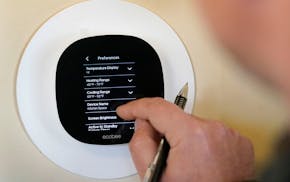Workers at a Target store in suburban New York City voted against joining a union Friday, bringing another defeat to organized labor in its attempts to penetrate the world of big retail.
The vote was 137 to 85, as Target workers in Valley Stream, N.Y., declined to be represented by the United Food and Commercial Workers International Union (UFCW). If the union effort had prevailed, it would have been the first time workers have organized at the nation's second-largest retailer.
Despite the defeat, several experts predicted union activity will pick up at other big-box retailers and non-union grocery stores.
UFCW Local 1500 spokesman Patrick Purcell predicted organizing efforts in the New York area would continue. "This is only Round One," he said.
Purcell added that the union is "going to protest the election and call for a re-election. We will file our objections on Monday."
A Target spokeswoman declined to comment.
Labor organizers in the Twin Cities said they've been emboldened by the Valley Stream battle.
"This is the start of something," said Bernie Hesse,special projects director of Local 1189 of the UFCW in Minneapolis. "This is not something we're going to fold up and put away, regardless of the outcome."
The retail industry has been among the most difficult for unions to organize because of its transient workforce. In Valley Stream, the vote ended a months-long battle, punctuated by bitter talk and accusations of wrongdoing from both sides.
Target argued that its employees are better off working with the company than a union. Company officials said workers should have the right to work without paying union dues. The union countered that the vote was about the right to work more hours than Target currently allows.
The grousing continued up to voting day.
Some Target workers arrived to vote in free shuttles or with bus passes provided by the company. Target said free rides and bus passes were a way to make sure everyone participated. The UFCW suggested an ulterior motive.
"Free rides to the polls when the company does not usually provide them can be viewed as an attempt to keep track of who voted and who didn't," Purcell said. "This ultimately is surveillance, which is illegal."
Not necessarily, said Al Blyer, the Brooklyn regional director of the National Labor Relations Board (NLRB), which oversaw the election. "Generally, either side can provide free transportation to the polls."
Target and the UFCW have filed allegations of unfair labor practices with the NLRB. The UFCW will have five to seven days to file objections over the outcome of the vote.
In Minneapolis, UFCW Local 1189 and UFCW 789 members along with Communication Workers of America members dotted Nicollet Mall during the lunch hour Friday, handing out fliers and talking to passersby about Target worker practices.
The vote in New York "shows a growing frustration with the tradition of low wages and low benefits," said Don Seaquist, president of UFCW 1189. "These are folks trying to be breadwinners, who have lost jobs in manufacturing and are now working retail."
In 2004 and 2005, there were attempts to organize Target stores in the metro area, Hesse said. A lack of momentum and energy among workers, as well as Target's "effective union avoidance program," doomed the efforts, Hesse said.
In New York, Target said in a company flier that there were no guarantees that the Valley Stream store would stay open if workers chose union representation. The suggestion that the store might close became the basis of a union complaint to the NLRB.
Target has withstood four other union-organizing attempts. In 1990, workers voted down a union at a Target store near Detroit. Five years later, Target warehouse workers in Pueblo, Colo., rejected unionization. Target warehouse workers in Tifton, Ga., turned down union representation in 1997. Then, a few years later, a Target store in Salinas, Calif., scheduled a vote to organize, but the union called off the election, presumably because it thought it would lose.
The organizing effort in Valley Stream began over the winter. The union filed for an election in early spring, sparking a battle between Target and the union to convince workers who had their best interests at heart. The union talked about its typical contracts that guaranteed part-time workers 16 to 20 hours a week at a time when some said Target only scheduled them for 10 hours a week.
Jim Spencer • 202-408-2752
Starbucks takes on the federal labor agency before the US Supreme Court
Stock market today: Wall Street poised to open with gains as corporate earnings reports pour in

